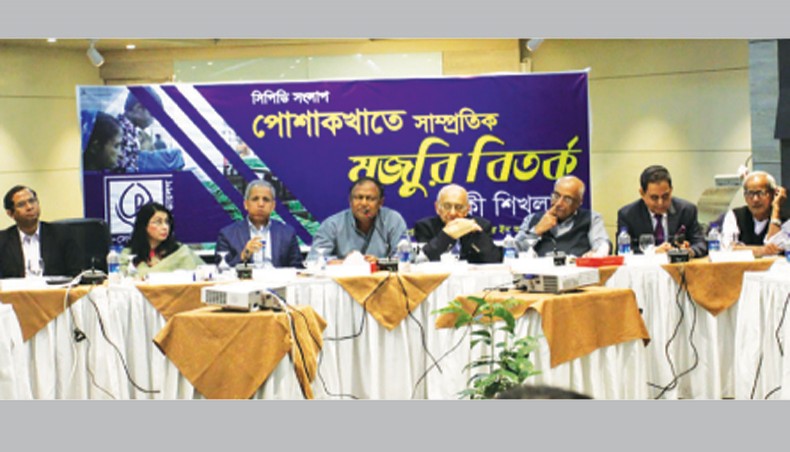Commerce minister Tipu Munshi speaks at a CPD dialogue on ‘Recent Wage Debates in the Garment Sector: What We Learnt’, chaired by Centre for Policy Dialogue chairman Rehman Sobhan at BRAC Centre Inn in Dhaka on Saturday. Federation of Bangladesh Chambers of Commerce and Industry president Md Shafiul Islam Mohiuddin and Bangladesh Garment Manufacturers and Exporters Association president Md Siddiqur Rahman and CPD distinguished fellow Debapriya Bhattacharya were present, among others. — New Age photo
The country’s readymade garment workers were being victimised because of their recent movement against disproportionate increase in wages as the factory authorities filed cases against hundreds of workers and fired many from jobs, said participants in a dialogue on Saturday.
The recent labour unrest took place due to problems in new wage structure, weakness in enforcement of new wage structure and noncompliance of entrepreneurs in the implementing process, Centre for Policy Dialogue research director Khondaker Golam Moazzem said in his keynote paper in the event.
CPD organised the dialogue on ‘Recent Wage Debates in the Garment Sector: What We Learnt’ held at BRAC Inn Auditorium in the capital.
Moazzem said that workers were pushed to adverse situation in raising their demands as a section of factory authorities threatened workers to close factories and another section threatened to dismiss of job and arrest.
As per the rule punitive measures should be enforced against factories which were non-compliant but unfortunately it was the workers, not the owners, who were being penalised, he said asking if it was the reverse rule.
Workers were threatened with permanent job cut in the RMG sector if they were black listed and were reported in the newly created biometric database, he said in his presentation.
Moazzem in his presentation showed that institutional process was ignored in setting minimum wage and minimum compliance requirements, including prevailing increments, had to be taken into consideration.
He summed up 10 lessons from various issues of non-compliance in implementing new minimum wages including necessity for upward adjustment of basic wages of all grades, that increments should be allocated based on skills and that wage demand of workers in upper grades need to be taken into account.
Labour leaders in the event alleged that workers continued to be victimised after the movement related to new wage structure as more than 30 cases were filed against 5,000 to 5,500 workers.
At the same time, factory managements were suspending workers for their alleged involvement in vandalism during the movement, former secretary general of IndusrtiALL Bangladesh Council said.
He demanded that grade of workers be mentioned in their ID cards and attendance sheet.
Former IBC secretary general Babul Akter said that more than 30 cases were filed against 5,000-5,500 named and unnamed workers and many of them were suspended from jobs.
Demanding incentive like garment factory owners, Babul said that the government should provide incentive for workers through ration, low-cost accommodation, health service and education for workers’ children.
Bangladesh Garment Workers Trade Union Centre president Mantu Ghosh said that violent protests took place when police declined to allow any democratic space to workers.
The government and factory owners would have to allow freedom of speech of workers and their trade union rights, he demanded.
Commerce minister Tipu Munshi instructed BGMEA president to look into the recent issue so that no innocent workers were harassed in the sector.
He instructed that no case was filed against any innocent workers and that they were not terminate.
Denying allegations from labour leaders, Bangladesh Garment Manufacturers and Exporters Association president Md Siddiqur Rahman said that factory authorities never set excessive production target and never forced workers to work extra time.
He assured that factory owners would not fire any innocent workers from job.
Federation of Bangladesh Chambers of Commerce and Industry president Md Shafiul Islam Mohiuddin said that there were some people and countries who were against development of Bangladesh and tried to create unrest in the sector.
He proposed to hold elections in the sector for formation of trade union saying that ‘forming trade union is a right while the workers also have the right not to form trade union.’
CPD chairman Professor Rehman Sobhan said that there was nothing new in the dialogue as workers for 25 years had been complaining about insufficiency of their wages.
‘Every civilised country practicing democracy should ensure basic subsistence income and decent living condition of workers,’ he said.
Professor Sobhan said that RMG exporters’ body was not less powerful than the government and they had built up collective power but labour leaders remained divided between hundreds of different trade unions and talking in hundreds of different voices.
‘Who will take you seriously? If you do not come together and create a collative bargaining position,’ he added.
Source: New Age.

